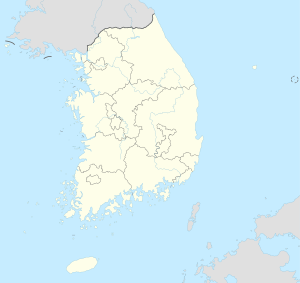List of provincial-level cities of South Korea
| Special metropolitan city | |
| Hangul | |
|---|---|
| Hanja | |
| Revised Romanization | teukbyeolsi |
| McCune–Reischauer | t'ŭkpyŏlsi |
| Metropolitan city | |
| Hangul | |
| Hanja | |
| Revised Romanization | gwangyeoksi |
| McCune–Reischauer | kwangyŏksi |
| Special self-governing city | |
| Hangul | |
| Hanja | |
| Revised Romanization | teukbyeol-jachisi |
| McCune–Reischauer | t'ŭkpyŏl-chach'isi |
| This article is part of a series on the |
| Administrative divisions of South Korea |
|---|
| Provincial level |
| Province (list) |
| Special self-governing province (Jeju, Gangwon and North Jeolla) |
| Special city (Seoul) |
| Metropolitan city (list) |
| Special self-governing city (Sejong) |
| Municipal level |
| Specific city (list) |
| City (list) |
| County (list) |
| Autonomous District (list) |
| Submunicipal level |
| Administrative city (list) |
| Non-autonomous District (list) |
| Neighborhoods and Towns |
| Town (list) |
| Township (list) |
| Neighborhood (list) |
| Villages |
| Village (list) |
| Communities |
| Ward |
Province-level cities are one of the first-level administrative divisions within South Korea. There are three types: special, metropolitan, and special self-governing.
Position in hierarchy and types
[edit]Province-level cities have equal status to provinces in the South Korean administrative scheme, and are among the highest-ranked administrative divisions of South Korea. There are three kinds of first-level city in South Korea.
| Type | Hangul | Hanja | RR | City names | No. of cities |
|---|---|---|---|---|---|
| Special Metropolitan City | 특별시 | 特別市 | teukbyeolsi | Seoul | 1 |
| Metropolitan City | 광역시 | 廣域市 | gwangyeoksi | Busan, Daegu, Incheon, Gwangju, Daejeon, Ulsan | 6 |
| Special Self-Governing City | 특별자치시 | 特別自治市 | teukbyeol-jachisi | Sejong | 1 |
- Seoul was designated a "special free city" (teukbyeol jayusi; 특별자유시; 特別自由市) separate from Gyeonggi Province on August 15, 1946; it became a "special metropolitan city" on August 15, 1949.[1]
- Metropolitan cities were called "direct control (meaning directly-administered) city" (jikhalsi; 직할시; 直轄市) before 1995.
Administration
[edit]In South Korean special metropolitan city and metropolitan cities, the mayor is the highest-ranking official in charge. The mayor is directly elected by the people registered in the city for a duration of four years (e.g., the mayor of Seoul).
Metropolitan functions such as water supply and public transport are integrated into the sole prefecture other than scattered to each municipality.
List of province-level cities
[edit]| Name | Hangul | Hanja | Type | ISO | Population (2017) |
Area (km2) |
Density (/km2) |
City seat | Region | Province split from |
Year of Split |
|---|---|---|---|---|---|---|---|---|---|---|---|
| Busan | 부산광역시 | 釜山廣域市 | Metropolitan city | KR-26 | 3,416,918 | 769.89 | 4,438.18 | Yeonje | Yeongnam | South Gyeongsang | 1963 |
| Daegu | 대구광역시 | 大邱廣域市 | Metropolitan city | KR-27 | 2,453,041 | 883.56 | 2,776.31 | Jung | Yeongnam | North Gyeongsang | 1981 |
| Incheon | 인천광역시 | 仁川廣域市 | Metropolitan city | KR-28 | 2,925,967 | 1,062.60 | 2,753.59 | Namdong | Sudogwon | Gyeonggi | 1981 |
| Gwangju | 광주광역시 | 光州廣域市 | Metropolitan city | KR-29 | 1,496,172 | 501.24 | 2,984.94 | Seo | Honam | South Jeolla | 1986 |
| Daejeon | 대전광역시 | 大田廣域市 | Metropolitan city | KR-30 | 1,525,849 | 539.35 | 2,829.05 | Seo | Hoseo | South Chungcheong | 1989 |
| Sejong | 세종특별자치시 | 世宗特別自治市 | Special self-governing city | KR-50 | 356,278 | 465.23 | 594.52 | Boram-dong | Hoseo | South Chungcheong | 2012 |
| Seoul | 서울특별시 | 서울特別市* | Special metropolitan city | KR-11 | 9,741,381 | 605.21 | 16,095.86 | Jung | Sudogwon | Gyeonggi | 1946 |
| Ulsan | 울산광역시 | 蔚山廣域市 | Metropolitan city | KR-31 | 1,157,077 | 1,060.79 | 1,090.76 | Nam | Yeongnam | South Gyeongsang | 1997 |
Notes: There are no Hanja for "Seoul"; in Chinese, it is written as 首爾/首尔 (pinyin: Shǒu'ěr), a transcription based on the pronunciation of "Seoul". As a suffix, the character Gyeong (경; 京) is used, which means "capital".
See also
[edit]- Administrative divisions of South Korea
- Cities of South Korea
- List of cities in South Korea
- Provinces of South Korea
- Special cities of North Korea
References
[edit]- ^ 행정연혁 (in Korean). Seoul Metropolitan Government. Archived from the original on 20 March 2013. Retrieved 15 March 2013.

